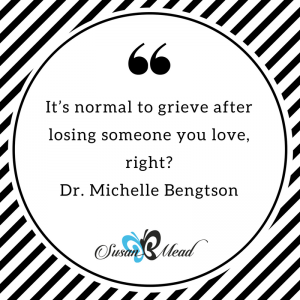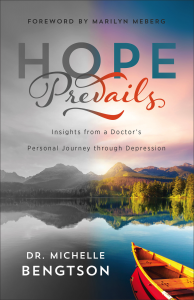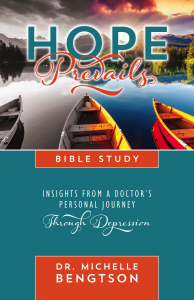“Is it grief or something more?” she asked, with tears streaming down her face. “I mean, it’s normal to grieve after losing someone you love, right?”
Before I could even answer, she quickly added, “And why can’t anyone seem to understand? They lost her too!”
As I listened to her questions, and began to formulate a response, I remembered my own experience. Almost nine months after losing my mother and best friend, I had to figure out how to negotiate our first Christmas without her. I wasn’t ready to assume the role of matriarch of the family, but somehow it was thrust upon me. By 10:00 on Christmas morning, I was done. I wanted every decoration taken down and put away. It was more than I could bear. I wanted Christmas behind me. I wanted the pain to go away. I wanted others to understand.
As a board certified neuropsychologist, patients come to my office with a variety of concerns: grief after losing a loved one, anxiety, depression, memory loss after concussions, stroke, or dementia, just to name a few. Sometimes it helps just to share and get an objective opinion. Sometimes we are a little too close to the situation to be able to assess our own situation clearly. That was the case here.
First, it’s important to discuss the fact that everyone grieves differently. Several people may grieve the loss of the same individual, yet the rate and depth and way they grieve will be individual and unique to each of them. We can’t set limits or boundaries on how people grieve any more than we can to how the sun rises each morning. We know it will, but it’s different in its glory, majesty, and radiance every day.
But what I do know is that you can take comfort in knowing that when it seems others don’t understand, or they grieve differently than you do, God understands and He longs to comfort you.
“The LORD is close to the brokenhearted; he rescues those whose spirits are crushed.” (Psalm 34:18)
And when you feel alone and like others don’t understand, you can call on God, and He will listen and answer your cries.
“I call on you, my God, for you will answer me; turn your ear to me and hear my prayer.” (Psalm 17:6)
In His loving-kindness, God knew that it would hurt our hearts to lose those we love. He also knew that we would need to grieve not only people but grieve loss of dreams, hopes, and desires.
[Tweet “Grief is a natural, normal, healthy way to process loss. #HopePrevails”]When grief lasts an extended period of time, however, or begins to effect our health and functional activity, it can sometimes progress into depression.
Some signs and symptoms of depression may include: Feeling sad, blue, down, or numb or perhaps, feeling irritable or agitated, concentration difficulty, feeling guilty, feeling worthless, helpless, or hopeless, difficulty making decisions. Other symptoms include decreased energy or motivation, decreased interest in previously enjoyable activities, decreased social interaction with friends or family, or crying more frequently than usual or thoughts of suicide. Sometimes the signs are more subtle such as a change is sleep patterns (either sleeping more or sleeping less), a change in appetite (either eating more or eating less), unintentional weight gain or loss, unremitting aches/pains, excessive use of substances, and excessive work absences.
If you notice that more than three or four of these have been true for you for more than a couple of weeks, and it has been longer than six months since your loss, I would encourage you to see your general medical practitioner to first rule out a medical reason for these symptoms. If no medical reason can be found, then it would be appropriate to seek out a mental health practitioner to provide you with support and assistance.
Whether you’re going through grief after the loss of a loved one, or walking through the valley of depression, I encourage you to guard your own heart and mind. Times like that are open season for the enemy to come and encamp and wreak havoc during a particularly vulnerable time.
We have between 30,000-70,000 thoughts each day. If we are not careful, we can begin to think things that are not helpful to our well-being. Scripture is very clear that “We demolish arguments and every pretension that sets itself up against the knowledge of God, and we take captive every thought to make it obedient to Christ.” (2 Corinthians 10:5) Essentially, we have to examine our thoughts and make sure that they are consistent with Scripture and what God says about us. If they are not, we need to reject them and replace them with truth.
Even during the painful times, the times of grief and loss, and times when we experience debilitating depression, we can take God at His word. He promises that He works ALL things together for our good. It can be hard to see, and hard to understand, but that’s were faith and trust come into play.
“And we know that God causes everything to work together for the good of those who love God and are called according to his purpose for them.” (Romans 8:28)
Finally, extend yourself some grace, just like you would offer to others. You will get through this, with God’s help.
[Tweet “Because of Him, #HopePrevails!”]For a Free eBook on How to Help a Depressed Loved One, click here: http://drmichellebengtson.com/how-to-help-a-depressed-loved-one-ebook/
For more helpful information about what you need to know when you have a depressed loved one, read here: http://drmichellebengtson.com/10-things-to-know-if-you-have-a-depressed-loved-one/
For more about what not to say to a depressed loved one, read here: http://drmichellebengtson.com/what-not-to-say-when-a-loved-one-is-depressed/
And here are suggestions about supportive things you can say to a depressed loved one: http://drmichellebengtson.com/what-to-say-when-a-loved-one-is-depressed/
Dr. Michelle Bengtson (PhD, Nova Southeastern University) is an international speaker, and the author of best-selling “Hope Prevails: Insights From a Doctor’s Personal Journey Through Depression” and the newly released companion “Hope Prevails Bible Study.”
She has been a neuropsychologist for more than twenty years. She is in private practice in Southlake, Texas where she evaluates, diagnoses, and treats children and adults with a variety of medical and mental health disorders. Dr. Bengtson knows pain and despair firsthand and combines her professional expertise and personal experience with her faith to address issues surrounding medical and mental disorders, both for those who suffer and for those who care for them. She offers sound practical tools, affirms worth, and encourages faith. Dr. Bengtson offers hope as a key to unlock joy and relief—even in the middle of the storm. She and her husband of 30 years have two teenage sons, and reside in the Dallas/Ft. Worth area. She blogs regularly on her own site: http://www.DrMichelleBengtson.com
For more hope, stay connected with Dr. Michelle. Here’s how:
To order Hope Prevails: http://drmichellebengtson.com/hope-prevails-book/
Website: http://www.DrMichelleBengtson.com
Blog: http://drmichellebengtson.com/category/blog/
Facebook: https://www.facebook.com/DrMichelleBengtson
Twitter: http://www.Twitter.com/DrMBengtson (@DrMBengtson)
LinkedIn: http://www.LinkedIn.com/in/DrMichelleBengtson
Google+: http://www.google.com/+MichelleBengtson
Instagram: http://www.instagram.com/drmichellebengtson
Pinterest: http://www.Pinterest.com/Drbhopeprevails
YouTube: https://www.youtube.com/channel/UCn92DHzGSZk8psDb2FKazOQ
To order Hope Prevails from Amazon: https://www.amazon.com/Hope-Prevails-Insights-Personal-Depression/dp/080072707X/





Always believe that God will never leave us.. thanks for the reminder, Susan
Thanks so much for this encouragement and the beautiful scripture reminders. I’ve been grieving the suicide of a dear friend over the past month. It really is such a vulnerable time for those of us who struggle with depression. I have definitely been fighting that old demon lately as well. I’ll take your words with me today :).
Such a great post with some really good thoughts on grieving. It’s true that we all grieve differently and there is grace for all.
Blessings!
Thank you for this helpful post on grief and depression.
I wonder why it’s so hard to extend grace to ourselves that we would extend to others. You’re right to point out that each person grieves so differently. We should never assume “our” way is the only way or the right way. Good advice here!
Grief is heartbreaking and can be life changing if not kept a close eye on. Depression is a scary thing and something that way too many people are dealing with on their own. Thank you for laying out the warning signs of depression and advising people to seek help. There is no shame in dealing with depression. The real shame comes when we don’t deal with depression. Thank you for today’s link up!
Wow!! When Michelle said,
“Whether you’re going through grief after the loss of a loved one, or walking through the valley of depression, I encourage you to guard your own heart and mind. Times like that are open season for the enemy to come and encamp and wreak havoc during a particularly vulnerable time.”
The Lord must want me to keep this message close to heart. My post this week and I wrote for next week are about that very thing!!!
God wants us to be on guard at all times!!!
Susan, this is absolutely wonderful!
I’m grateful for those who write about the hard places in grief. There’s not many of us out there. Yet, it truly is SO needed!
I can certainly relate to the frustrations that come with the individual differences in grief. When my husband and I lost our daughter, we grieved so differently. Sometimes it felt as though we were miles apart, though under the same roof. It was often very lonely.
But one of the beautiful patterns we discovered, was that on my hardest days, he was able to lift me up. And vise versa- on his hardest days, I was able to return the favor. We rarely were ever on the same page. But I think that was God’s grace after all!
So thankful for Michelle, and for you! I LOVE your website AND the name of your link up! Grateful for the opportunity to post here. 🙂
-Rachel
I hope you have a swell last few days of October!
Such an important topic that we don’t talk enough about. Grateful for the infusion of hope in the hard places.
Susan,
Thanks for sharing Michelle’s new release. I’m so thankful for how Michelle is helping people around the globe with her books and her story.
Praying you have a blessed week, full of HOPE!
~Sherry Stahl
xoxo
Excellent points here. Grief can be overwhelming.
Thanks, Susan, for sharing Michelle’s wisdom and clinical expertise.
This is such balanced advice for handling grief. We can’t put a deadline on it, but the power of God can move us through it in His own good time.
As a Beta reader for the study I can attest to how great it is! Hope Prevails.